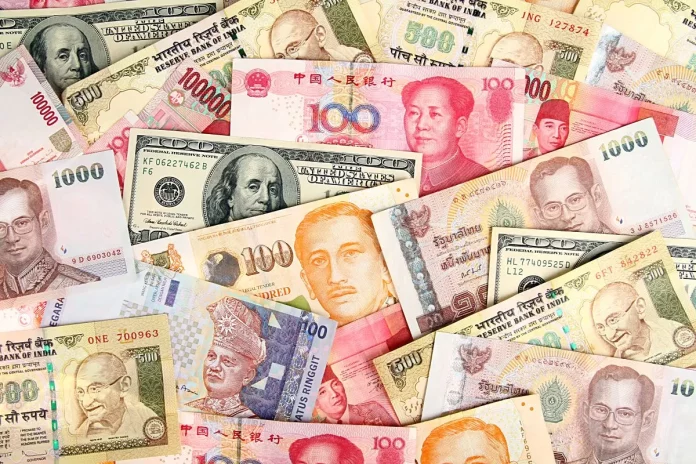Asian currencies rose on Monday as Chinese markets resumed trade after a week-long Lunar New Year break, while investors awaited key central bank events this week, including a widely expected quarter-percentage point rate hike by the U.S. Federal Reserve.
Stock markets across the region fell, with China and Taiwan only trading in positive territory.
Chinese stocks jumped as strong consumer spending and a rebound in travel during the break boosted sentiment, while Taiwan shares hit their highest since late June.
The Chinese yuan rose 0.6% to hit a near two-week peak, while the Taiwan dollar firmed 0.7% to its highest since August 23 last year.
Thailand’s baht, which has been the region’s best performing currency so far this year, appreciated 0.3% to hover near its highest level in more than 10 months.
“Given the outlook on modest Fed hikes, we see some potentially stronger currency movements this week against the greenback, helped by the positive outlook on China,” analysts at MUFG Bank said in a note.
The Fed is widely expected to hike rates by 25 basis points (bps) on Wednesday. Market participants will be watching out for guidance on the central bank’s future policy decisions as U.S. inflation cools from decades-high levels.
“The Fed’s language would be scrutinised and we see risks that the Fed would prefer to err on the side of caution by mentioning about the stickier services CPI (consumer price index) and that could be a source of support for the U.S. dollar,” analysts at Maybank wrote in a note.
The dollar index, which measures the greenback against a basket of currencies, rose 0.04% to 101.93, as of 0609 GMT.
Most central banks in Southeast Asia are dialling back their policy tightening, with Malaysia’s central bank unexpectedly pausing, Indonesia signalling an early end to its cycle and the Bank of Thailand hinting at measured tightening ahead.
The Reserve Bank of India is expected to pause its hiking cycle after a likely modest increase of 25 bps at its meeting one week after New Delhi’s Feb. 1 budget, a Reuters poll showed.
Philippine stocks were the top losers among the region’s stocks markets, declining 1.7% to a more than two-week low. Indian shares shed 0.2%.
Most Adani group shares extended their sharp falls as a detailed rebuttal of a U.S. short-seller’s criticisms failed to pacify investors.
Stocks in Jakarta dipped 0.6%, while Singapore equities lost 0.4%.









